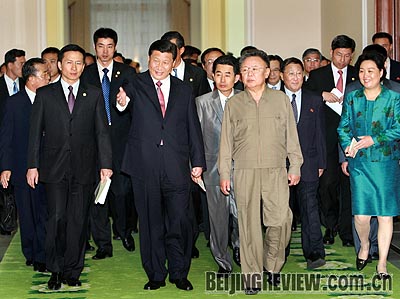|

LASTING FRIENDSHIP: North Korean leader Kim Jong Il (center right) talks with visiting Chinese Vice President Xi Jinping (center left) while they walk to a conference hall in Pyongyang on June 18
Chinese Vice President Xi Jinping debuted in his first performance on the international stage with a tour of five countries in Asia. On June 17-25, he paid state visits to North Korea, Mongolia, Saudi Arabia, Qatar and Yemen.
"Vice President Xi's tour is a voyage of friendship, communication and cooperation," Vice Foreign Minister Zhang Yesui told Xinhua News Agency. He added that the fruitful, practical and highly efficient tour would advance China's bilateral relationships with these countries.
The tour was Xi's first round of formal visits to other countries since he assumed office in March. It also was an important diplomatic mission for China, Zhang said.
Zhang said China and the five countries are strongly complementary in economic matters and have a solid basis for cooperation as well as great potential. China and these nations agreed to work together more in the areas of agriculture, trade and economy, energy, resources, infrastructure construction, culture, education, tourism, transportation and investment.
"This cooperation will put vigor into their bilateral relationships," Zhang said.
All five countries maintain traditional friendships with China. Xi said China was willing to enhance its friendship with the leaders of the five nations and promote bilateral communication and cooperation in politics, economy, culture and education. During his meetings with the leaders of the five countries, Xi stressed that China and the respective nations should respect each other and perfect their related policies and stipulations, while creating favorable investment environments.
"The magnificence of this tour is that it shows that China's leadership of a new generation is coming into being, and they have inherited China's consistent diplomatic policy," said Shi Yongming, an international affairs expert at the China Institute of International Studies (CIIS).
Shi stressed that Xi's visits indicated that China decided to communicate with high-ranking officials in the countries. They also were a good opportunity for Xi to show himself to the world, he said.
When Xi visited North Korea, the two sides agreed to make 2009 the "China-North Korea Friendship Year" to celebrate the 60th anniversary of the establishment of their diplomatic relations. China and North Korea also signed agreements on economic and technological cooperation, transportation, and inspection and quarantine rules.
Shi added that even though the North Korean nuclear issue is making progress, there still might be some difficulties, the tendency of which cannot be reversed. "Where Northeast Asia will go after the nuclear issue has been settled is important to the China-North Korea relationship," Shi said.
Shi pointed out that some observers have forecasted that North Korea might seek to contain China after the nuclear issue has been resolved. "This kind of comment does not have practical evidence," he said, adding that the facts prove that the only way to completely resolve the issue is for the parties involved to maintain a political balance. Establishing a peace mechanism and maintaining permanent peace in Northeast Asia are major concerns for the region and the world, he said.
China and North Korea have special ties that bind their peoples together, and these cannot be changed easily, Shi said. After the nuclear issue is resolved, their friendship and interdependence will still last, he said.
Because North Korea's economic base is weak, it might be included in the setting up of the Northeast Asia free trade zone (FTA), a move that would solidify its economic ties with China and the region, Shi said. He suggested that the Northeast Asia FTA borrow lessons from the Association of Southeast Asian Nations (ASEAN) in addressing the economic growth of its members. Among ASEAN nations, the gap between the per-capita gross domestic product (GDP) of the richest country and the poorest country is very wide.
"If the FTA is set up within 10 years, North Korea can become a member, because the other countries can agree on some beneficial policies for North Korea as well as offer economic aid to the country," Shi said. The recent agreement between China and North Korea proves that the two countries will continue to develop their relationship through strengthening their economic cooperation.
North Korea will have a strong ability to recover economically as a member of the FTA, Shi said. And once South Korea and North Korea start to develop harmonious relations, the latter will have a greater space for economic development, he added.
Xi and Mongolian leaders reached a consensus on further strengthening a good-neighbor policy and mutual-trust partnership. During his visit, Xi called for an early start of negotiations about a bilateral agreement on the management of border issues, as the two countries share an over 4,710-km-long borderline. Trade and economic cooperation between China and Mongolia rapidly develop in recent years. China has remained as Mongolia's top trade partner in the past nine years. In 2007, the bilateral trade volume reached $2.03 billion, increasing 28.4 percent than the previous year.
| 